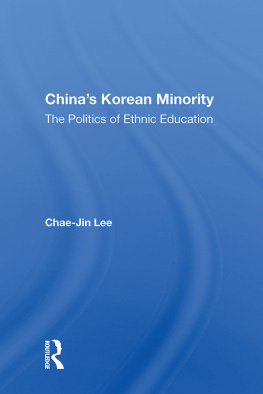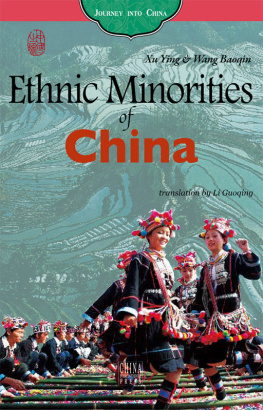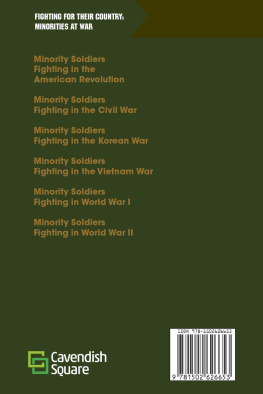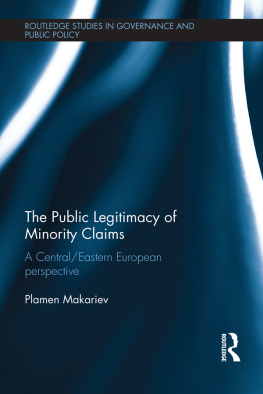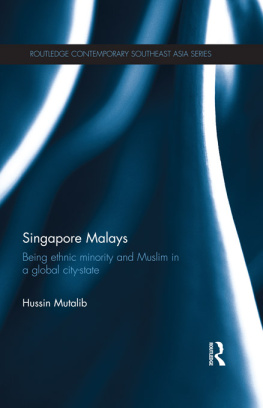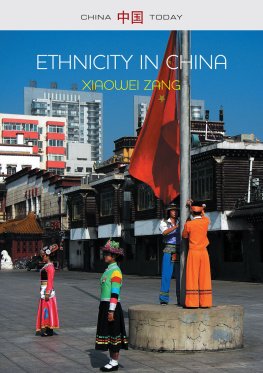About the Book and Author
The record of Korean education in the People's Republic of China reflects a complex relationship between Korean identity and China's shifting minority policy. In general, the Koreans have made a determined, though sometimes tortuous, effort to pursue their own ethnically based educational goals amidst the subtle, at times forceful, pressure for assimilation into the dominant Han culture of China. It is widely believed that among China's fifty-five minority nationalities the Koreans have managed to maintain the highest level of educational achievement while sustaining a strong sense of ethnic identity. This belief is borne out in the successful model for minority education found in the Yanbian Korean Autonomous Prefecture of Jilin Province.
This unique study highlights the development of ethnically based education for the Korean minority in China. With special emphasis on the Yanbian Prefecture, the author explores a set of interrelated questions: Why do Koreans pay so much attention to their own educational programs, especially ethnically oriented ones? How do they manage the challenges and opportunities of ethnic education in the context of China's changing political dynamics? What problems do they encounter in their search for educational excellence? And how effective is the Korean model for ethnic education in China? In answering these questions, the author addresses the issues of educational and cultural autonomy as vital aspects of China's minority policy.
Chae-Jin Lee is professor of political science and East Asian languages and cultures at the University of Kansas.
China's Korean Minority
The Politics of Ethnic Education
Chae-JinLee

First published 1986 by Westview Press
Published 2021 by Routledge
605 Third Avenue, New York, NY 10017
2 Park Square, Milton Park, Abingdon, Oxon OX14 4RN
Routledge is an imprint of the Taylor & Francis Group, an informa business
Copyright 1986 by Chae-Jin Lee
All rights reserved. No part of this book may be reprinted or reproduced or utilised in any form or by any electronic, mechanical, or other means, now known or hereafter invented, including photocopying and recording, or in any information storage or retrieval system, without permission in writing from the publishers.
Notice:
Product or corporate names may be trademarks or registered trademarks, and are used only for identification and explanation without intent to infringe.
Library of Congress Catalog Card Number: 85-31482
ISBN 13: 978-0-3670-0577-1 (hbk)
ISBN 13: 978-0-3671-5564-3 (pbk)
DOI: 10.4324/9780429035630
Contents
- 2. HISTORICAL SURVEY
- Korean Presence in China
- Korean Educational Development
- Notes
- 3. THE SEARCH FOR ETHNIC EDUCATION
- From the Civil War to the Korean War
- Political Autonomy and Ethnic Education
- Notes
- 4. THE PROCESSES OF ETHNIC INTEGRATION
- Rectification Movement
- Cultural Revolution
- Notes
- 5. CURRENT EDUCATION POLICY
- Ethnic Education Under Four-Modernizations
- Primary and Secondary Education
- Higher Education
- Notes
- 6. ASSESSMENTS AND CONCLUSION
- Notes
- 2. HISTORICAL SURVEY
- Korean Presence in China
- Korean Educational Development
- Notes
- 3. THE SEARCH FOR ETHNIC EDUCATION
- From the Civil War to the Korean War
- Political Autonomy and Ethnic Education
- Notes
- 4. THE PROCESSES OF ETHNIC INTEGRATION
- Rectification Movement
- Cultural Revolution
- Notes
- 5. CURRENT EDUCATION POLICY
- Ethnic Education Under Four-Modernizations
- Primary and Secondary Education
- Higher Education
- Notes
- 6. ASSESSMENTS AND CONCLUSION
- Notes
Guide
- 2.1 Korean Population in Manchuria, 1881-1943
- 2.2 Korean Population in Yanbian, 1910-1931
- 2.3 Korean Students in Manchuria, 1928
- 2.4 Private Schools Run by Koreans in Yanbian, 1932
- 2.5 Schools Established by Japan in Yanbian, 1932
- 3.1 Population Changes in Yanbian, 1944-1982
- 3.2 Education in Yanbian, 1944-1984
- 5.1 China's Educational Systems, 1981
- 5.2 China's Minority Education and Publications, 1952-1981
- 5.3 Curriculum for Korean Students in Yanbian
- 5.4 Colleges in Yanbian, 1980
- 6.1 Economic Conditions in Yanbian, 1981
- (Photo section follows p. 76)
- 1. Premier Zhou Enlai (middle) Visiting Yanbian with Chu Tok-hae (right) and Choe Su-han (left) in 1962
- 2. Yanji Railway Station--Sign Written in Korean, Chinese, and English
- 3. A Korean Village with Thatched-Roof Houses (1985)
- 4. Dancers at the Yanbian School of Fine Arts
- 5. Student Parade in Celebration of the 30th Anniversary of the Yanbian Korean Autonomous Prefecture (1982)
- 6. A Model Korean Teacher--Kim Chuk-hwa--in Liaoning Province (1982)
- 7. First Tumen Middle School--Principal Li Pyong-hak and His Daughter (1984)
- 8. In Front of the New Library of Yanbian University--(from left to right) President Pak Mun-il, Professor Li Hwi-il, Author, Vice-President Chong Pan-ryong, and Professor Choe Yun-gap (1984)
During my eight trips to the People's Republic of China since January 1976, I have made a persistent attempt to understand the circumstances of the Korean minority nationality in China. I visited the Yanbian Korean Autonomous Prefecture of Jilin Province (in 1984 and 1985) and other Korean communities, bought a substantial amount of relevant publications, and talked to several hundred Koreans in all walks of life. I was greatly impressed by their uniformly warm hospitality and enthusiastic cooperation. A number of Korean scholars and scientists at Yanbian University, Beijing University, Nankai University, the Central Nationalities Institute, the Chinese Academy of Social Sciences, and the Chinese Academy of Sciences were particularly helpful. They all exhibited a sense of pride in their remarkable educational and cultural accomplishments as a minority nationality. They shared their thoughts and experiences with me and sometimes invited me to their homes and offices. I also held discussions with Han Chinese officials and scholars who are knowledgeable about the Korean minority nationality. In the process I learned much about the historical development of educational programs for China's Korean minority. Even though all of their names are not listed here, I remain extremely grateful to each one of them. For this reason my study is dedicated to the two exemplary leaders of China's Korean minority-Hun Chong-il (former Vice Minister of the State Nationalities Affairs Commission) and Pak Mun-il (Yanbian University President).
I relied upon the Library of Congress and the Hoover Institution Library for major archival materials. The Center for East Asian Studies at the University of Kansas supported and facilitated my research. I am deeply indebted to Professors ChongSik Lee (University of Pennsylvania) and Dae-Sook Suh (University of Hawaii), who kindly read part of my manuscript and gave me valuable comments and suggestions. I wish to thank Dr. Key P. Yang (Library of Congress), Vice President Zong Qun (Central Nationalities Institute in Beijing), Professor Kanno Hiroomi (Tokyo University of Foreign Studies), Professors Philip West and Paul Draghi (Indiana University), Dr.Cho Sung-ok (Secretary-General of the Korean National Commission for UNESCO), President Park Il-jae (Korea Research Foundation), Professor Sung Chul Yang (University of Kentucky at Fort Knox), and Dr. Deok Kyo Lee (Oak Ridge National Laboratory) for their encouragement and support. I also gratefully acknowledge the assistance provided by Pam LeRow and Phyllis McEldowney at the University of Kansas, Of course, I am solely responsible for all contents of this study; hence none of the above-mentioned persons should be held accountable for any aspects of my work.

